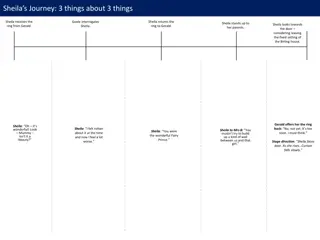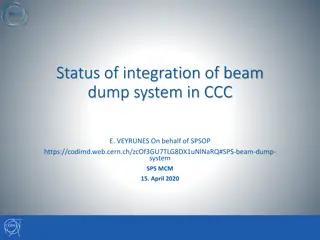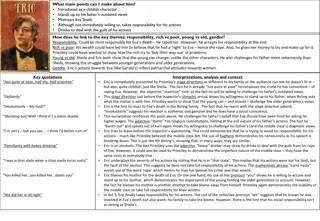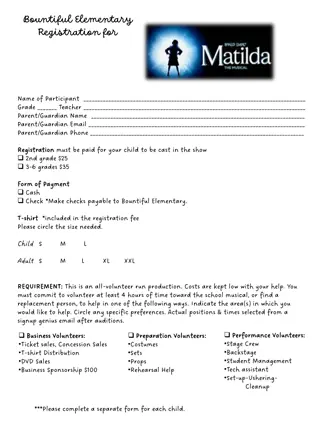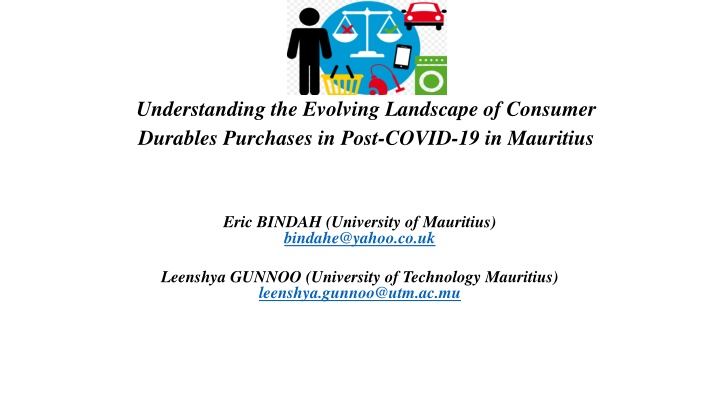
Exploring Consumer Behavior for Durable Goods in Post-COVID-19 Mauritius
"This research delves into the evolving landscape of consumer durable purchases in Mauritius post-COVID-19, analyzing factors influencing buying behavior and correlations with cultural, social, personal, and psychological aspects. The study aims to enhance understanding of consumer decisions in post-pandemic Mauritius."
Download Presentation

Please find below an Image/Link to download the presentation.
The content on the website is provided AS IS for your information and personal use only. It may not be sold, licensed, or shared on other websites without obtaining consent from the author. If you encounter any issues during the download, it is possible that the publisher has removed the file from their server.
You are allowed to download the files provided on this website for personal or commercial use, subject to the condition that they are used lawfully. All files are the property of their respective owners.
The content on the website is provided AS IS for your information and personal use only. It may not be sold, licensed, or shared on other websites without obtaining consent from the author.
E N D
Presentation Transcript
Understanding the Evolving Landscape of Consumer Durables Purchases in Post-COVID-19 in Mauritius Eric BINDAH (University of Mauritius) bindahe@yahoo.co.uk Leenshya GUNNOO (University of Technology Mauritius) leenshya.gunnoo@utm.ac.mu
Introduction There are multiple factors that affecting consumer buying behavior when they purchase durable goods. With the availability of local goods and also the increase in exported goods due to globalization, the process of purchasing durable goods become more complex. According to Tyagi (2019), since everything revolves around the buyer, analyzing consumer behavior has taken on increased importance. Kenton (2023) refers to consumer durables as goods or products that have a relatively long lifespan and are intended for repeated use over an extended period. These items are typically considered long-term investments by consumers because they can be used for an extended duration. Examples of consumer durables include appliances (e.g., refrigerators, washing machines), electronics (e.g., televisions, laptops), furniture, and automobiles. Given that there are not enough researches that closely assess the factors that influence consumer buying behavior for consumer durables in Mauritius post Covid 19, this research will help us to better understand how Mauritians carry out their purchase decision concerning consumer durables goods.
The objectives of this research are firstly to assess how consumers in Mauritius conduct their purchasing decisions of consumer durable goods post Covid-19 pandemic. This study will also aid to analyse how the factors of culture, social, personal and psychological influence consumer buying behavior of consumer durable goods in Mauritius post Covid 19 pandemic. Furthermore, it will help to determine which factor has the most robust correlation with consumer buying behavior in Mauritius post Covid 19 pandemic.
Literature Review The Stimulus-Response Model According to Kotler and Amstrong (2012), the black box model, illustrates the connection between the stimuli, the buyer's characteristics and behavior, the decision-making process, and the outcomes. External elements, or the 4Ps of marketing place, price, product, and promotion make up the stimulus. Macroeconomic factors including the economy, politics, society, and technology is also part of the stimulus. In the buyer's black box, which will subsequently give an indication of the responses, are buyer qualities like values, beliefs, lifestyle, and decision-making process. Culture H1: There is a significant positive relationship between cultural factors and consumer buying behavior for consumer durables post Covid-19 in Mauritius. Social Factors H2: There is a significant positive relationship between social factors and consumer buying behavior for consumer durables post Covid-19 in Mauritius. Personal Factors H3: There is a significant positive relationship between personal factors and consumer buying behavior for consumer durables post Covid-19 in Mauritius. Psychological Factors H4: There is a significant positive relationship between psychological factors and consumer buying behavior for consumer durables post Covid-19 in Mauritius.
Methodology The sample population chosen to answer the survey instrument was Mauritians above 18 years old. The Raosoft Software was used to calculate the recommended sample size for the Mauritian population above 18 years old, which according to the World Population Review (2023) consist of 1.055 million people. Using a 95% confidence level, the recommended sample is 383. Due to limited time constraints, non-probability sampling technique was used. A snowball sampling was used to gather data due to limited time constraints and more easy accessibility. This was done by sending online questionnaires to close friends and families and then making an appeal for them to share the questionnaire to their friends and families. The platform of Google Forms was used to design the questionnaire and then it was shared through social media platform such as WhatsApp, Facebook, and Instagram and also through mails. Analysis of the data to assess the factors that influence consumer buying behavior for consumer durables in Mauritius post Covid 19 was done using descriptive statistic, Pearson Correlation and Linear Regression. There were several limitations while carrying out the data collection. The first one was only 140 responses collected whilst the targeted population was 383 responses.
Analysis and Findings Demographic Profile From the sample survey, 33.8 % were female 66.2% were male. Most of the respondent in this study were aged between 26- 35 years old and between 18-25 years old which represented the young adults. The highest proportion which represents 29.5% chose the option of buying consumer durables on a frequent basis. And 26.6% of the respondents make their purchase one a year compared to 21.6% who have chosen twice a year. Finally, 22.3% of the sample population make their purchase for consumer durables more than two times in a year. Most of the respondents preferred to shop on the brand website (40.3%) when concern with the purchase on consumer durables after the pandemic. Furthermore, 22.3% choose to purchase in online market places, 20.1% of the respondents choose retail stores and the least amount choose the purchase of consumer durables in hypermarkets. Reliability Test The Cronbach Alpha is more than 0.9 for each section of the questionnaire. This demonstrate that the questionnaire was reliable and valid.
Descriptive Statistics Cultural Factors It can be deduced that most of the population of Mauritius do not consider buying product which are suitable according to their cultures. Moreover, it can be seen that their belief and tradition do not have an impact on the product they purchase neither they prefer buying from brand that support and contribute to cultural preservation. Social Factors It can be seen that the Mauritian population family s support holds moderate importance in their product choices with a mean of 3.51. Furthermore, the influence of family and friends on consumer durables is relatively stronger with a mean of 3.73 indicating that their recommendations significantly impact their buying behaviour. Personal Factors Age appropriateness holds moderate importance with a mean of 3.4, consumers prioritize products that best suit their occupation with a mean of 3.6. Budget consideration plays a significant role with a mean of 3.8, suggesting that for the Mauritian consumers, staying within their financial limitations is an important factor in their buying behaviour. Additionally, they prioritize choosing consumer durables that align with their personality with a mean of 3.7, indicating a desire to reflect their personal style and preferences through their purchases. Psychological Factors It can be deduced that Mauritians are moderately motivated to buy consumer durables based their attributes with a mean of 3.60. This shows that they consider the specific feathers and benefits of the products when making buying decisions. Furthermore, the sample population holds positive attitudes towards the consumer durables products they purchase with a mean of 3.77, reflecting a favourable perception that can influence their future purchasing behaviour.
Pearson Correlation The correlation coefficient between consumer buying behaviour and culture is 0.160. This value shows a positive correlation between the dependent and independent variables, but it is relatively weak. The correlation coefficient between consumer buying behaviour and social factors is 0.601. This value shows a strong positive correlation between the dependent and independent variable. The correlation coefficient between consumer buying behaviour and personal factors is 0.726. This value shows a strong positive correlation between the dependent and independent variable. The correlation coefficient between consumer buying behaviour and psychological factors is 0.633. This value shows a strong positive correlation between the dependent and independent variable.
Recommendation and Conclusion This study reveals that Mauritian consumers exhibit a preference for careful consideration and planned buying decisions over impulsive choices when purchasing consumer durables products. Additionally, they are inclined to explore multiple brands rather than adhering to a single brand, suggesting that brand loyalty may not be a dominant factor. Most of the sampled population acknowledges the evaluation of alternatives before making a purchase decision, indicating that consumers in Mauritius have well-defined preferences and criteria for their buying choices. In conclusion, the findings of this study provide a comprehensive snapshot of consumer behavior in the post-COVID-19 landscape of Mauritius. While cultural, social, and psychological factors appear to have limited influence, personal factors, and economic conditions emerge as the driving forces behind consumer choices. It is imperative for businesses to adapt to these evolving consumer preferences, focusing on factors like product quality, pricing, and performance, as well as leveraging the growing trend toward online shopping. Future research should continue to monitor and explore the shifting dynamics of consumer behavior in the ever-changing post-pandemic environment.



